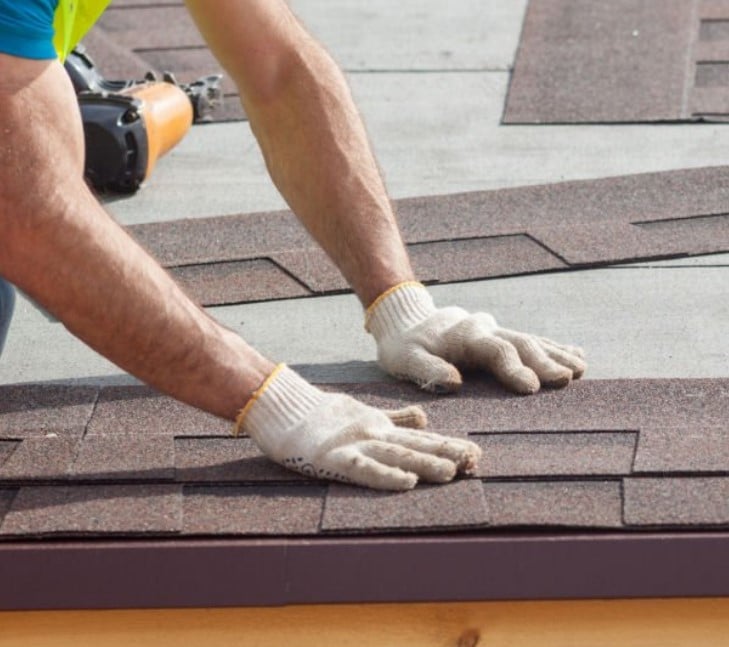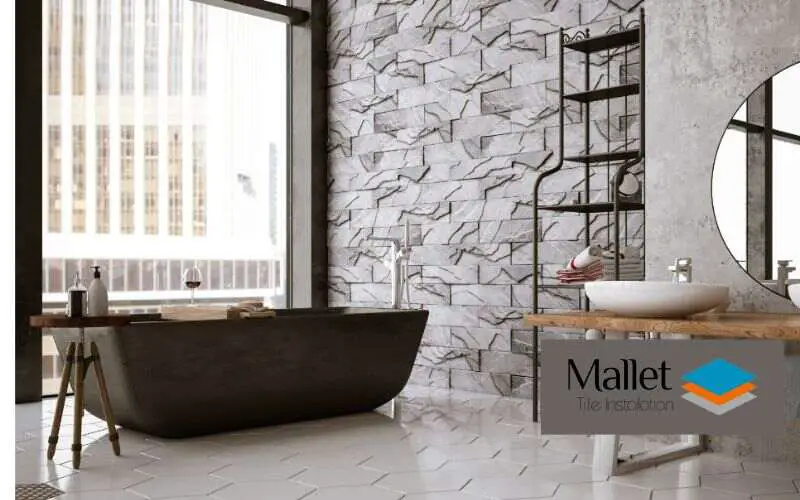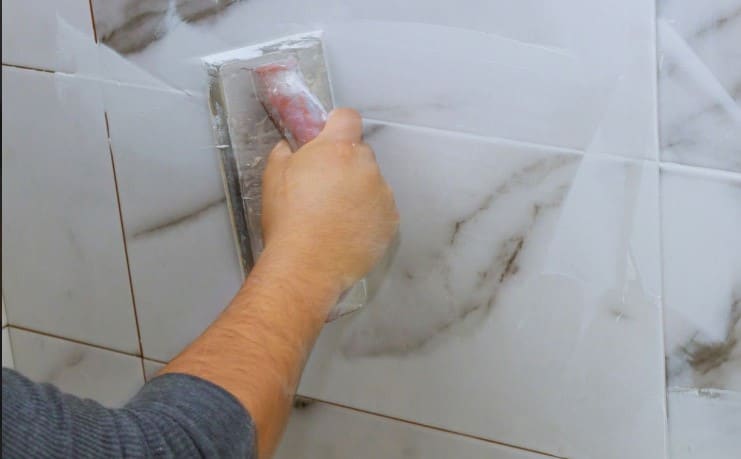Tiles decorate our homes in myriad ways—sprucing up floors, walls, and even ceilings with their diverse patterns, colors, and materials. But like any investment in our homes, they demand care. Understanding the Importance of Regular Tile Upkeep isn’t about obsessing over every speck of dirt; It’s about ensuring longevity and vibrancy in the professionals for tile repair’ appearance.
Different types of tiles, from ceramic to porcelain to natural stone, each boast their durability profiles. However, the eternal truth remains: preventive measures can significantly Extend Tile Life. Simple actions, like regular cleaning or using the right sealant, go a long way.
Signs Your Tiles Need Professional Attention
Ever noticed an imperfection in your tile floor and wondered if it was serious? Here’s a quick guide:
Cracked Under Pressure: Identifying Cracks in Your Tiles
When you first spot a small crack, you might think it’s no big deal. However, even one little crack can be a problem because it lets in water and dirt. Over time, this can lead to bigger issues. And if you start to see more cracks, or a single crack begins to grow, it’s serious. This is your signal to call in experts who know how to fix it. They can help make sure your problem doesn’t get worse and save you from future headaches. So, remember, seeing cracks might not seem like an emergency at first, but taking care of them quickly can help in the long run.
Loose Ends: When Tiles Start to Detach
When tiles start acting like they have a mind of their own and peel away from where they’re supposed to stick, it’s not just about how they look. Sure, it makes the place seem unkempt, but the real worry is that it can be downright dangerous. Imagine walking across the room, your foot catches on a loose tile, and down you go. Ouch! That’s not a situation anyone wants. It’s far better to tackle this problem head-on rather than wait for an unwanted trip or fall. Some professionals know exactly how to fix these stubborn tiles and get them to stay put. So, don’t just put up with this ‘let me go’ attitude from your tiles. Reach out to the experts before a small issue turns into a big, hazardous one.
Stained Reputation: Addressing Persistent Tile Stains
Sometimes, no matter how much you scrub and clean, some stains just won’t go away. It can be frustrating, especially when it’s on your tiles, making them look not so great. Before you decide to hide those spots with a rug or think about pulling your hair out, there’s another option you might not have considered yet: calling in the pros. Professional cleaners or repair experts know all the tricks and have the right tools to make those stubborn stains disappear. It’s like giving your tile installation a new life, making them look as good as the day they were laid down. So, before you give up on your stained tiles, think about getting some expert help to bring back their shine and save their reputation.
Common Causes of Tile Damage
Understanding what harms our tiles helps us protect them better. Let’s dive into some usual suspects:
Water Woes: How Moisture Undermines Tile Integrity
Water is like a sneaky troublemaker in our homes, especially when it starts hiding under the floor tiles. Imagine water slowly sneaking in, almost like it’s tip-toeing so we don’t notice. Over time, this can make the tiles less sticky to the floor, and they might even start to lift or crack. This is not just about the tiles looking bad, though. When water hides like this, it can also make mold grow, which is not good for us to breathe in. The smart move is to keep an eye out for any signs that water is playing this sneaky game. Spotting things like tiles that feel loose or seeing spots on the ceiling below can be clues. Catching these hints early means we can fix the problem before it gets bigger and keep our homes safe and sound.
Heavy Impact: The Effects of Physical Force on Tiles
When you drop something heavy on the floor, it’s not surprising that the tiles can crack. But did you know that just walking or placing things in the same spot over and over can also harm tiles? This kind of wear and tear is less obvious but can gradually make tiles look worn out or even cause damage. It might not seem like a big deal at first, but it could hint at deeper problems with your flooring. This is why getting a professional to check things out is smart. They can tell if you just need a quick fix for a cracked tile or if there’s a bigger issue with how your tiles are holding up to stress. Don’t wait until you have a bunch of broken tiles; getting advice early can save you time and trouble later on.
Age-Related Wear and Tear: The Inevitable Timeline
Just like us, tiles get old. Over time, their shiny surface may lose its sparkle, and their corners might get little breaks or chips. It’s pretty cool to see how tiles show signs of aging because they add character to a space, making it feel lived-in and cozy. However, sometimes, these signs of wear and tear can make a place look messy or even be unsafe if the damage is bad enough. When this happens, giving the tiles a little TLC through repairs or putting in new ones might be a good idea. This keeps the room looking beautiful and makes sure it’s a safe place for everyone to enjoy. Keeping our spaces in good shape is like taking care of a precious memory, ensuring it stays bright and inviting for years to come.
DIY Vs. Professionals for Tile Repair: Making the Right Choice
Evaluating the Extent of Damage: A DIY Possibility?
Tackling small chips and cracks around your home can be a fun and rewarding way to spend your weekend. Rolling up your sleeves and fixing these minor issues yourself can make you feel like a DIY wizard, saving you money and sprucing up your space. However, it’s super important to remember that what seems like a tiny problem on the surface might be a sign of something bigger lurking underneath. Before you grab your tools and get to work, take a moment to look at the issue. If the crack is growing or if the chip is part of a bigger item that’s often used, it might be time to call in a professional. This doesn’t mean your DIY dreams are crushed; it just means you’re being smart about keeping your home safe and sound. Always remember, that fixing small things is great, but knowing when to ask for help is even better.
Tools of the Trade: When Lack of Proper Equipment Hinders DIY Efforts
When it comes to fixing broken tiles, it’s not just about finding the right kind of filler to patch things up. It goes way beyond that. You see, having the right tools and knowing how to use them properly is super important. If you don’t have these, there’s a pretty big chance you might end up making things worse rather than fixing them. It’s like trying to fix a delicate toy with only a hammer and no idea what you’re doing—odds are, the toy won’t be looking any better. So, if you’re scratching your head, wondering how to start, or worried you might mess it up, it might be a good time to call in professionals for tile repair. These guys know exactly what they’re doing. They’ve fixed a tile or two in their day and have all the fancy tools and know-how to get the job done right. Plus, calling them in saves you the headache of accidentally turning a small chip into a big problem.
The Benefit of Experience: Why Professionals Often Do It Better
When we hire professionals, we’re not just getting someone to fix a current issue. We’re bringing on board a powerhouse of experience and knowledge. These experts don’t simply patch up what’s broken; they have an eagle’s eye for spotting troubles that might pop up in the future. This means, that by using their services, we’re essentially dodging bullets that could have cost us more time, more money, and lots more headaches down the road. It’s like having a superpower that tells you where the next problem might arise and nipping it in the bud before it blooms into a full-blown disaster. In the long run, investing in a professional’s expertise is a smart saver of money, time, and peace of mind.
Selecting the Right Tile Repair Service
Choosing the right professional isn’t just about scrolling through listings. Consider this:
Credentials and Experience: What to Look For
When you’re looking to hire someone, whether it’s a carpenter to fix your kitchen cabinets or a tutor to help your kid with math, you should do a little homework first. It’s a good idea to look at what they’ve done before. Think about it like checking out the comments on a movie before you decide to watch it. This can give you a clue if they’re good at what they do. Also, don’t be shy to ask them if they have any special training or certificates that show they’re real pros in their field. Another smart move is to ask for references. This means asking them to give you the names of people they’ve worked for before who can say, “Yes, this person did a great job for me.” This is a bit like asking your friends if the new burger place in town is any good before you spend your allowance there. It’s all about making sure you’re picking the right person for the job, so you end up happy with the work they do.
Budget Considerations: Finding a Balance Between Affordable and Quality
When looking for a service to use, it’s easy to think that the cheapest option is the best choice. After all, who doesn’t want to save money? However, this isn’t always the case. Sometimes, paying a little extra gets you a service that’s a lot better and more reliable. It’s like when you buy a toy. Imagine choosing a cheap toy; it might break the next day. But if you spend a bit more on a toy that’s made better, it can last a whole lot longer and be more fun to play with. This doesn’t mean you have to find the most expensive thing out there. The trick is to look for a happy middle ground where the cost and the quality balance out. This way, you get good value without spending too much or getting something that doesn’t work well. It’s about getting the best bang for your buck and not ending up disappointed or something that breaks quickly.
Reviewing Reputation: The Importance of Customer Feedback
When you’re thinking about trying a new shop or service, it’s a smart move to see what other people are saying about them online. Picture this: you find a bunch of positive comments from folks who’ve already given it a go. They’re saying things like, “Wow, that was an amazing experience!” or “They went the extra mile.” This is a good sign that you’re likely to walk away happy too. On the flip side, if folks are mostly giving it the thumbs down, saying it wasn’t what they hoped for, you might decide to look elsewhere. Plus, don’t forget to chat with your friends and family. If they’ve tried it and had a good time, that’s another green light. In the end, happy customers usually mean the service is spot on, so doing a bit of homework before you dive in can save you time and make sure you end up smiling too.
Concluding Summary
Taking care of the tiles in your home is like making sure your favorite toy stays in good shape – you do it because you love seeing it look its best! Sometimes, tiles can get cracked, chipped, or loose. This is when you know it’s time to call in the experts. You wouldn’t want just anyone fixing your favorite toy, right? Well, choosing the right people to repair your tiles is just as important. Look for a repair service that has lots of happy customers and can show you their great work. When you pick a skilled team to fix your tiles, you’re not just mending what’s broken; you’re making sure your home stays as beautiful and safe as the place you love the most.
Remember, it’s all about keeping everything looking great and feeling sturdy under your feet, ensuring your house remains the cozy retreat you treasure every day.
Frequently Asked Questions
Q: How often should tiles be checked for potential repair needs?
Tiles should be visually inspected at least once a year, but immediately address any obvious damages or changes.
Q: Can small cracks in tiles be ignored?
Small cracks should be addressed to prevent them from becoming larger issues.
Q: Is it more cost-effective to repair or replace damaged tiles?
It depends on the extent of damage; minor issues can be repaired, but extensive damage might warrant a replacement.
Q: How can I prevent tile damage in the future?
Regular maintenance, using mats or rugs in high-traffic areas, and immediate cleanup of spills can go a long way.
Q: Can all types of tiles be repaired, or are some better off replaced?
Most tiles can be repaired, but in some cases—especially with rare or unique tiles—replacement might be necessary.









